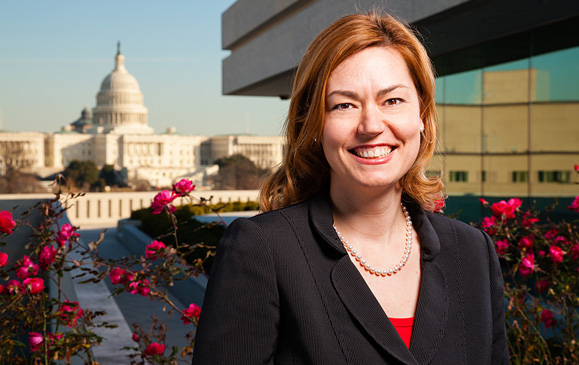Christine Hanson (BA’94, LLB/MPA’98): Diplomatic Influence
Christine Hanson (BA’94, LLB/MPA’98) has seen humanity at its best and worst. As a teenager, she was in Germany when the Berlin Wall came down, and recalls the immense sense of hope and optimism it inspired there and around the world. More than a decade later, she was in New York as the tragic events of 9/11 unfolded.
These historic moments had a profound impact on Hanson, steeling her resolve and commitment to being a force for positive change in the world. She worked on the UN Resolution on Measures to Eliminate International Terrorism and helped establish an international court to bring perpetrators of genocide, war crimes and crimes against humanity to justice. And she advised the government on sensitive humanitarian law cases such as Omar Khadr and Afghan detainees.
Today, Hanson is in Washington, D.C., continuing to hone her diplomacy skills as Minister-Counsellor for Congressional and Intergovernmental Affairs with the Embassy of Canada. She and her colleagues are keeping an eye on hundreds and hundreds of US bills under consideration, lobbying for changes wherever and whenever necessary. It’s a lot of long hard hours, but it’s rewarding work for this diplomat and international lawyer because she knows her office is making a difference.
“People don’t often realize how much impact US legislation can have on our country. We have the world’s largest trade relationship – $1.9 billion in goods cross our border every day, we share the world’s longest unprotected border. And we have 300 treaties and agreements that govern how our countries cooperate. That’s why we’re there: to ensure this relationship runs as smoothly as possible, which means pushing for changes to legislation that could have a negative impact on Canada.”
Nova Scotia-born and raised, Hanson’s appetite for a career in international affairs was whetted when her father was posted to Germany in 1989. “I was attending an international school in Holland and discovered there was a model UN and got involved. I travelled to The Hague several times to participate and I think that was the turning point for me. I met many international students and began to realize there were many opportunities out there for me in the world. I just didn’t know how to seize them yet.”
Returning to Nova Scotia, Hanson followed her heart, and her older sister, to Dalhousie University, where she majored in Political Science. She was determining whether to do her master’s in public administration or law when the university announced a joint master’s program covering both fields. Realizing she could have it all, Hanson enrolled.
“It opened a lot of doors for me. I got a great education, made a lot of friends and the university helped me earn international work experience at the UNICEF regional office for East Asia & the Pacific in Thailand through the Study Work International Fund. I’m grateful to Dalhousie for that opportunity.”
After graduating Hanson articled with Cox Downie, now Cox & Palmer, and hired on as an associate. She loved the work, but her heart was still set on a career in international affairs, so she wrote the Foreign Service exam in 1999. Being one of 10,000 people to take it, she thought nothing would come of it. To her surprise, Hanson found herself in Ottawa one year later working in the Legal Bureau of the Department of Foreign Affairs. She spent the next twelve months in the criminal and diplomatic law section working on the Andrei Knyazev case – the Russian diplomat who killed a woman while drinking and driving. That led to changes in Canada’s policy on diplomats driving under the influence.
Hanson then landed a highly coveted job as Junior Advisor at Canada’s Mission to the UN in New York in September 2001. She spent the weeks following 9/11 working with the Legal Affairs Committee, which was coordinating the UN Resolution on Measures to Eliminate International Terrorism.
“You can imagine the climate for achieving a resolution like that,’ says Hanson, who assisted with negotiations. “It wasn’t easy to get everyone to come to a consensus on it, but it was an unforgettable experience and an honour to be part of it.”
More international postings followed. She assisted the Canadian delegation in the negotiations for the Rome Statute, a series of meetings during the UN General Assembly to establish the new International Criminal Court (ICC). She worked on cross-border issues with US politicians in Washington, D.C through the Congressional and Legal Affairs section. And she served as executive assistant in the Ambassador’s office to Michael Kergin and Frank McKenna before returning to Ottawa in 2005 to head up the Canadian International Criminal Tribunals Unit.
Hanson next participated in Canada’s Sudan Task Force, advising the government on humanitarian law cases as deputy director of the Human Rights and Humanitarian Law section. Then, in 2011 after serving as director of Treaty Law Division, she found herself back in Washington, D.C. in her current role as Minister-Counsellor for Congressional and Intergovernmental Affairs.
By and large, Hanson and her team are highly effective in protecting Canada’s interests, and the nation’s relationship with the US. Yet she is not one to take credit for her office’s successes. “I’m serving the Canadian government. I’m representing the Canadian people. This is a joint effort and I’m very lucky to be part of that, and to represent Canadian interests abroad.”
